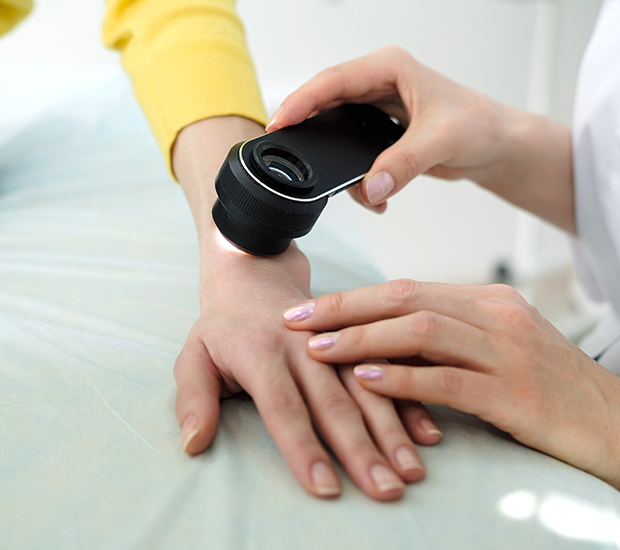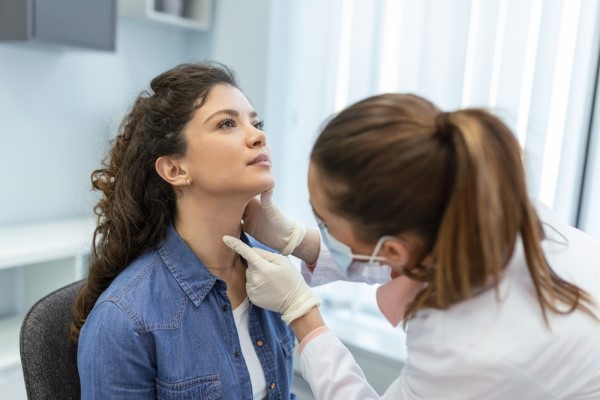Skin BiopsySeiling, OK
Medical diagnostics serve a vital purpose in detecting various conditions. Learning about a problem as soon as possible helps doctors develop an optimally effective treatment plan. A skin biopsy is a diagnostic test that involves removing skin cells for further study.
A skin biopsy is available at Janey L Hammons NP-C in Seiling and the surrounding area. Our doctors may recommend a biopsy for a variety of reasons. In each case, discussion with a doctor can help patients understand their situation and make medical decisions that are right for them.
Biopsies help to detect different skin conditions. Seeing a doctor about any concerns you have is the first step towards getting a treatment plan designed for your situation. Call us at (580) 922-4406 to make an appointment.
Understanding a Skin Biopsy
A biopsy involves surgically removing a portion of the skin for diagnostic purposes. Sometimes a biopsy may also be performed as a treatment for the removal of a lesion. After removal, the skin portion will go to a laboratory for analysis. Depending on the type of biopsy and the suspected or present condition, there may be a variety of laboratory tests that will be necessary.
Main Types of Skin Biopsies
As WebMD explains, there are four major types of skin biopsy. The doctor chooses the specific biopsy depending on an individual patient's health issues and the tests they need. Skin biopsies usually fall into one of the following categories:
- Excisional: This biopsy involves using a scalpel to remove the entire area of abnormal skin together with some of the normal skin. The cut usually goes down to or through the fatty layer of the skin. This technique is common when the abnormal area, such as a lump or a lesion, is relatively small.
- Incisional: This method is similar to an excisional biopsy. A scalpel cuts down to or through the fatty skin layer. However, this procedure only removes a portion of the abnormal part of the skin. This can be the case when there is a more substantial area where skin changes have taken place.
- Punch: A circular blade cuts out a thickness of the skin. Local anesthesia will prevent the patient from feeling any pain during the procedure. If the tumor is thought to go deeper into the dermis, the second layer of skin, this technique may be recommended. A punch biopsy is often necessary to diagnose a rash.
- Shave: As the name suggests, a razor-like tool scrapes the surface of the skin. We will numb the specific area of the patient’s skin during the procedure.
What To Expect Before and After a Skin Biopsy
A skin biopsy is an outpatient procedure, usually in the doctor's office. Before the skin biopsy, we will clean the area of the skin that we will focus on during the biopsy. The doctor or nurse may use a surgical marker to outline the area. Patients are given a local anesthetic to numb the biopsy site.
After numbing the site, the doctor performs the biopsy. With a shave biopsy, it will involve scraping the skin. The doctor will apply pressure to the wound or use topical medication to stop the bleeding. If a punch or excisional biopsy is necessary, stitches may be required to close the wound. Then a bandage will be placed on the site to protect the wound. A skin biopsy usually takes about 15 to 30 minutes.
After the biopsy, protect the biopsy site for one to two days to avoid bumping the area or stretching the skin. The biopsy site wound should heal within a few weeks. During the healing, time, wash hands with soap and water before and after taking the bandage off and replacing it. Wound care is required until the skin recovers.
Skin Biopsy Results
The doctor sends the skin biopsy sample to a laboratory for testing after the biopsy. Results from a skin biopsy may take several days to a couple of weeks, depending on the type of biopsy and laboratory procedures. Metabolic or genetic testing can take several months. Discuss the timeline for getting results with the doctor. Once the doctor receives the results, an appointment may be required to discuss the next steps for treatment.
Get in Touch With Medical Professionals
A skin biopsy helps a doctor diagnose skin disorders and cancers. Our practitioners can discuss your concerns about your skin. Call Janey L Hammons NP-C at (580) 922-4406 to schedule an appointment in Seiling.
FAQs About a Skin Biopsy
Why do I need a skin biopsy?
A doctor may perform a skin biopsy if the patient has skin symptoms such as a persistent rash, open sores, or an irregular mole or growth. The diagnosis of the correct skin condition makes treatment more effective.
How long will it take to get results from a skin biopsy?
Laboratory procedures vary based on the type of skin condition and skin biopsy performed. It often takes one to two weeks to get the results, but it can take longer. Discuss the wait time with the doctor.
Will I have a scar from a skin biopsy?
Skin biopsies generally cause a small scar, according to the Mayo Clinic. The size and severity of the scar depend on the type of biopsy and where the skin is removed. Biopsies on the neck or upper torso may be more prominent. The scar may be pink at first, then fade to white or brown over time.
Does a skin biopsy hurt?
Skin biopsies are usually performed using a local anesthetic administered by injection. A small pinch may be felt when the medication is injected. Some patients feel pressure during the procedure.
What skin conditions can a biopsy detect?
A skin biopsy is used to detect skin cancers, such as melanoma or basal cell carcinoma. A biopsy can also identify eczema, psoriasis, and infections. If the results are normal, it means no skin disease or skin cancer was found.
Are there risks associated with a skin biopsy?
The biopsy site may be sore or bruised for a few days following the biopsy. There may be some bleeding at the wound site. If the symptoms prolong for more than a few days, talk to the health care provider.





